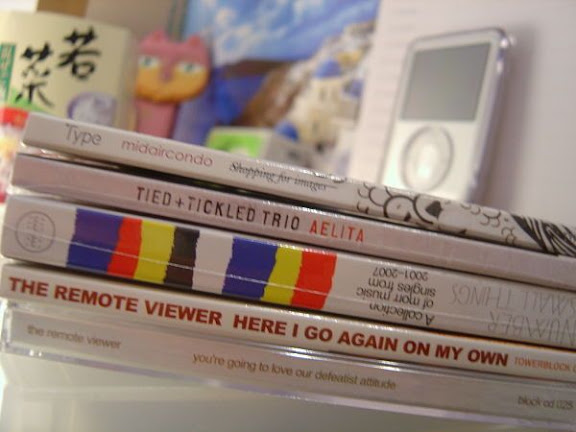 “In 2006 EMI, the world’s fourth-biggest recorded-music company, invited some teenagers into its headquarters in London to talk to its top managers about their listening habits. At the end of the session the EMI bosses thanked them for their comments and told them to help themselves to a big pile of CDs sitting on a table. But none of the teens took any of the CDs, even though they were free. ‘That was the moment we realised the game was completely up,’ says a person who was there.” 以上是08年1月第2期The Economist一篇关于music industry的文章的开篇,虽然谈不上真知灼见,倒也再次把音乐工业的何去何从摆上了台面。
“In 2006 EMI, the world’s fourth-biggest recorded-music company, invited some teenagers into its headquarters in London to talk to its top managers about their listening habits. At the end of the session the EMI bosses thanked them for their comments and told them to help themselves to a big pile of CDs sitting on a table. But none of the teens took any of the CDs, even though they were free. ‘That was the moment we realised the game was completely up,’ says a person who was there.” 以上是08年1月第2期The Economist一篇关于music industry的文章的开篇,虽然谈不上真知灼见,倒也再次把音乐工业的何去何从摆上了台面。首先最简单直白的问题就是,“你还在买CD吗?”也许更正确的问题应该是,“你有多久没买过CD了?” 每个时代都有不同承载声音的工具,我们是cassette和CD的一代。小学是床头的录音机或Walkman,中学时代的Discman,对大多数人来说,换成了现在小巧玲珑人见人爱的iPod。时代变迁带来的当然不仅仅是音乐形式内容上的发展。当传统CD shop的数量在持续减少,当records销售的P/L越来越不健康,当无数音乐下载网站如雨后春笋般堆得到处都是的时候,死硬的CD派和顽固的守旧者离投降的日子也不远了。
不好意思,俺就是一死硬CD派。时髦一点,这叫做vintage。反应比较慢,接受新事物的能力肯定已就慢上半拍。塑料圆盘带给音乐的,是附加的快感。很早就学会了习惯,习惯了音乐来自于CD,习惯了一个透明的盒子,sleeve covers,加上一张圆盘,这个整体。这大概就是所谓的整体大于部分之和吧?当一切都变成数码和online,失去的也许不仅仅是CD握在手中那沉甸甸的感觉。在无数唱片中捣腾,最后寻到宝藏的喜悦,不是在iTune上点一下左键就能体会到的。
也许五年之后,CD也会步其前辈后尘,成为少数人的收藏品。这也是宿命,不可避免。乐观点说,人会学着习惯。


2 comments:
The tendency you mentioned is getting more apparently serious topic in Japan as well. We can still see a variety of CDs in Shops, but the actual amount of purchased CDs are dwindling... yes, due to recent conversion to other music media (like mp3). Some musician tend to release their songs as being downloaded on web, instead of usual CDs. So, I bit sympathize with buffs like you (still holding fantastic sleeve covers with CDs in my treasure box)
Just noticed the important thing I should have had to make sure... from your uploaded photo.
Post a Comment